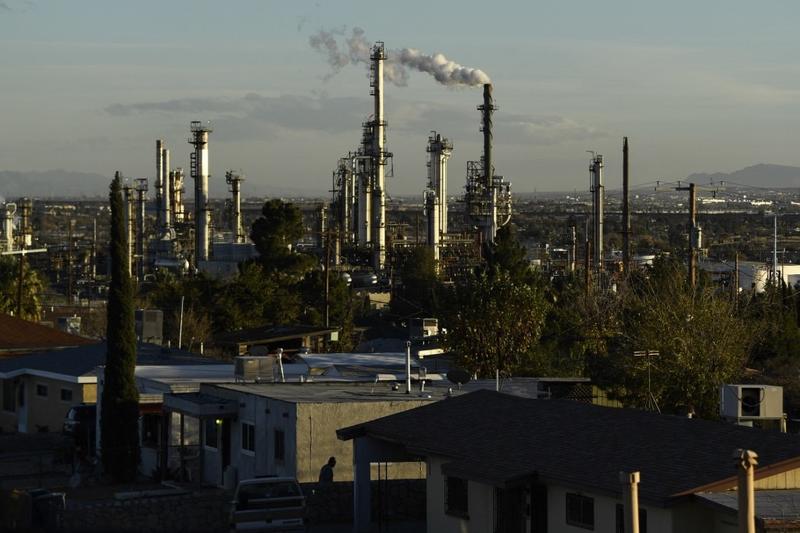 A person walks by a home as the Marathon Petroleum Corp El Paso oil refinery operates near a neighborhood of homes in East-Central El Paso on Dec 10, 2021 in El Paso, Texas. (PATRICK T FALLON / AFP)
A person walks by a home as the Marathon Petroleum Corp El Paso oil refinery operates near a neighborhood of homes in East-Central El Paso on Dec 10, 2021 in El Paso, Texas. (PATRICK T FALLON / AFP)
A federal judge invalidated the results of an oil and gas lease sale in the Gulf of Mexico on Thursday saying the Biden administration failed to properly account for the auction's climate change impact.
The decision has cast uncertainty over the future of the US federal offshore drilling program, which has been a big source of public revenue for decades but also drawn the ire of activists concerned about its impact on the environment and contribution to global warming.
The Gulf of Mexico accounts for 15 percent of existing US oil production and 5 percent of dry natural gas output, according to the Energy Information Administration.
In the decision, Judge Rudolph Contreras of the United States District Court of the District of Columbia ruled to vacate the Bureau of Ocean Energy Management's Lease Sale 257, which offered about 80 million offshore acres in the Gulf of Mexico in an auction last November
In the decision, Judge Rudolph Contreras of the United States District Court of the District of Columbia ruled to vacate the Bureau of Ocean Energy Management's Lease Sale 257, which offered about 80 million offshore acres in the Gulf of Mexico in an auction last November.
ALSO READ: US, Mexico to restart economic talks after 4 years on Sept 9
The sale generated more than $190 million, the highest since 2019, on 1.7 million acres sold. It drew bids from US oil majors including Exxon Mobil Corp and Chevron Corp.
Thursday's decision came after the environmental group Earthjustice challenged the sale on behalf of four other green groups, arguing US President Joe Biden's Interior Department was relying on a years-old environmental analysis that did not accurately consider greenhouse gas emissions that would result from development of the blocks.
Contreras agreed, faulting the administration for excluding foreign consumption from its greenhouse gas emissions analysis and for ignoring the latest science about the role of oil and gas development on global warming.
The Interior Department, which oversees federal oil and gas development, said it was reviewing the decision.
Campaign pledge
Biden campaigned for the White House partially on a pledge to end federal oil and gas drilling to fight climate change, but efforts to suspend new auctions failed after Gulf Coast states sued.
"We have documented serious deficiencies in the federal oil and gas program," Interior spokesperson Melissa Schwartz said in a statement. "Especially in the face of the climate crisis, we need to take the time to make significant and long overdue programmatic reforms."
Congress has mandated that the United States hold regular auctions of public lands for oil and gas development.
"We are pleased that the court invalidated Interior’s illegal lease sale," said Brettny Hardy, Earthjustice’s senior attorney, in a statement. "We simply cannot continue to make investments in the fossil fuel industry to the peril of our communities and increasingly warming planet."
ALSO READ: US arrests wife of Mexico cartel chief El Chapo on drug charges
It was unclear how the ruling would affect the administration's plans to offer more than 300,000 acres of onshore leases to drillers by the end of this quarter. Like the Gulf sale, those auctions were initiated after a federal judge in June ordered the government to resume oil and gas leasing.
The offshore drilling industry slammed the decision.
"Uncertainty around the future of the US federal offshore leasing program may only strengthen the geopolitical influence of higher emitting - and adversarial - nations, such as Russia," National Ocean Industries Association President Erik Milito said in reaction to the ruling.
Scott Lauermann, a spokesman for oil industry lobby group the American Petroleum Institute, said the API was "reviewing the decision and "considering our options."
The decision is not the first time a court has cited faulty environmental analyses in blocking oil and gas development on federal lands. In August, a federal judge reversed the government's approval of a $6 billion ConocoPhillips development in Alaska, a decision that was cited in Contreras' ruling.


